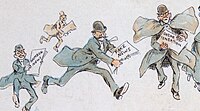
Photo from wikipedia
This article examines the complex boundaries between 'fake news', speculation, hypothesis, gossip and whistleblowing during the COVID-19 pandemic. It shows that apparently authoritative sources and experts gave information or policy… Click to show full abstract
This article examines the complex boundaries between 'fake news', speculation, hypothesis, gossip and whistleblowing during the COVID-19 pandemic. It shows that apparently authoritative sources and experts gave information or policy recommendations that have turned out to be wrong, sometimes dangerously so, and explores the kinds of bias that enter medical advice and planning decisions. The article then diagnoses a WhatsApp voice-note from a young South African doctor that went viral and was denounced as 'fake news' because of obvious errors. This note, however, revealed behind the scenes medical thinking about subjects that professional bodies and authorities usually avoid discussing publicly. In highlighting what apparently authoritative sources omit and distort, the article suggests that journalists should report medical advice, even from authoritative sources, with caution and shows that apparently 'fake' news may reveal issues other news sources neglect.
Journal Title: Journal of African Media Studies
Year Published: 2021
Link to full text (if available)
Share on Social Media: Sign Up to like & get
recommendations!